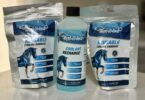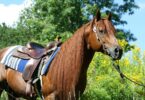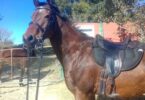Ready to Get Saddle Savvy?
If you have ever tried to find a saddle to fit a Thoroughbred (especially an off-the-track Thoroughbred, OTTB), you know how quickly saddle fit discussions go from OTTB to “oh no.”
While no single article on the internet can properly fit a saddle to you or your horse, this list of English saddles and some quick tips should help get your search off on the right foot, debunk some misnomers, and help you and your horse find comfort in the saddle!
Finding a saddle that fits you and your OTTB partner is not easy. Not only are Thoroughbreds often pre-installed with features like high withers and simultaneously broad shoulders, many are sensitive or have issues keeping on weight which makes adjustability, comfort and versatility top of mind when searching for the right saddle. Our list tackles issues such as rider height, adjustability, weight, overall design, and durability.
| Saddle | Category | Price Range | Key features |
| Arena High Wither AP Saddle with HART | Most versatility | High | Ample channel, 2 available colors, combination of real and synthetic leather design |
| HDR Synergy Close Contact | Best for tall riders | Mid | Variety of flap lengths available, lifetime tree warranty, adjustable gullet |
| HDR Vegan X All Purpose | Most bang for your buck | Low | Looks just like real leather, 3 seat types available (Dressage, All Purpose, Jumping), hose-off to clean |
| Wintec 500 series | Most durable | Low | Waterproof, long lasting, highly adjustable, 3 seats (Dress, AP, Jump) |
| Collegiate Integrity Mono Dress Saddle | Most secure seat | Mid | Monoflap design for optimal feel, surface knee and thigh blocks with added wear guards in high friction areas |
| Collegiate Lectern |
Most saddle fit adjustability | Low | Y-girthing system, close contact feel without the price, comfortably placed knee blocks |
Saddle Fitting 101: How to Correctly Fit a Saddle (to horse and human!)
Schleese Saddlery has a fantastic 9 part video set of at-home saddle fitting tips that I have found very helpful when assessing saddle fit for my own horses and can be found here.
Tips 6 through 9 might be a little bit harder for the untrained eye, so ask for help from a pro if you aren’t sure.
- With your horse standing squarely and on level ground place your saddle on your horse’s bare back and assess the balance – the seat should be parallel to the ground
- Are there 2-3 fingers of clearance for the withers?
- Is the channel wide enough front to back for the horse’s spine? The channel should be about 4 fingers to a hand’s width apart for an average-sized horse, maybe wider if you have a big-boned Thoroughbred!
- Panel contact – do the panels of the saddle sit in even contact with the horses back without pinching or gaping
- Billet placement – are the billets hanging directly perpendicular to the ground? If they are angled either forward or backward the saddle may feel unbalanced or uncomfortable for the horse once you climb aboard
- Is the saddle an appropriate length for the horse’s back? A saddle that reaches to the horse’s loin or puts weight-bearing pressure on the shoulder is too long! (Although this is usually less of an issue with Thoroughbreds, in my experience)
- Is the saddle straight or does it tilt off to one side? Sometimes this could be due to muscular or conformational imbalances – seek a pro saddle fitter or a vet if you are unsure!
- Saddle tree angle – typically calculated with a gauge, you want the angle of the tree to match the angle of the horses shoulder to avoid pinching
- Saddle tree width – can the horse’s shoulder move freely up and back without interference with the saddle?
Once you’ve made a proper fit assessment for the horse, you’ll be able to better assess the fit for the rider. You’ll want about a hand’s distance between the nail on the front of your saddle and your thigh, as well as a hand behind your bum and the back of the saddle.
While mounted in the new saddle you will want to feel stable, comfortable and be able to hang your legs in a vertical line from shoulder hip to heel without feeling like you’re falling backwards or forwards.
My best advice is to not get hung up on a seat size and go with what fits your body best and makes you feel the most comfortable and balanced while mounted. Tall riders might need to consider saddle options with longer or more forward flaps, while more petite riders might want to consider a saddle with a narrower twist or shorter flaps.
Best English Saddles for OTTBs
Arena High Wither AP Saddle with HART
Using “High Wither” in the title is sort of a misnomer here – but that doesn’t discount this saddle from our list! The main difference between this saddle and the Arena AP Saddle with Hart is that this saddle simply comes with a narrow gullet plate pre-installed instead of the medium plate.
Regardless, this saddle still makes our list because it boasts a ton of adjustable features for horse and rider, has the best of both worlds with both synthetic and real leather components and offers a comfortable and well positioned rider experience.
This model also has wider panels to distribute weight evenly over the barrel and includes the CAIR system. You’ll be able to address fit issues alongside a professional saddle fitter and if you already have a Wintec or Bates saddle you’ll be able to swap gullet plates interchangeably between them.
PROS:
- Easy-change gullet system, commonly found and compatible with both Wintec and Bates saddles
- Real leather for the look and synthetic leather in high wear areas, for easy cleaning
- Comfortable
- Easy to care
- Moveable knee blocks to fine tune your position
- CAIR system
CONS:
- Tree width is no different than standard Arena AP saddle escape that it comes with the “narrow” green gullet pre-installed rather than the standard “medium” black gullet
- Not all professional saddle fitters are familiar with making adjustments on CAIR system saddles
- Higher end of price range
Check it out at State Line Tack
HDR Synergy Close Contact
For a saddle that will last and fit in the jumping or eventing disciplines, this close contact jumping saddle from Henri De Rivel is a great option. The all-leather design has a quilted leather calf block to stabilize your leg over jumps, IGP gullet system installed and a forward flap; taller riders, this might be the saddle for you!
Reviewers have even said that this gullet change system is easier to use than the easy change system found in Wintec, Arena, and Bates saddles.
I’ve had an HDR in my tack room for the last 12 years and it has aged beautifully, the foam panels are holding up nicely and it’s just as comfortable as the first day I sat in it.
PROS:
- IGP Gullet system – medium plate installed
- Durable high density foam panels
- All leather design
- Sporty look
- Forward flap
- Lifetime warranty on the injection-molded polymer tree
CONS:
- Panels cannot be adjusted like you would with wool flocking, corrective pads are suggested
- Horses that tend to have a weaker topline might struggle with fit in these saddles, specifically gaps between the panels and the horse’s back
- Short billets
- Cannot adjust the knee blocks
Check it out at State Line Tack
HDR Vegan X All Purpose Price: Low <$500
When I was on the hunt for a new everyday saddle to start my rescue thoroughbred in, the Vegan X line was a top contender! If you’re looking for something animal product-free that is lightweight and easy to care for – this is the saddle for you.
Reviews say this saddle is comfortable, durable and especially great as a starter saddle or for youngsters.
This saddle and the other saddles on the Vegan X line caught my eye when I was searching for a saddle because of both the simple design elements that HDR brings to their other saddles and my love of my other HDR products. Rather than the foam panels installed in the Synergy and some other HDR models, this model has synthetic wool flocking making it easily adjustable by a wide variety of saddlers.
An added bonus? The low price point cannot be overlooked!
PROS:
- Animal product free
- Low price point
- Synthetic wool flocked
- Cutback pommel
- Wide channel
- Others with hard to fit horses are finding success here
CONS:
- Only available in one color
- Fixed tree
- Squeaky noise when you ride
Wintec 500 All Purpose
Wintec saddles have been in my tack room since day one at my first riding school! I love how long these saddles last and how versatile they are. I’ve used Wintecs on trails, in the ocean, to horse shows, lessons, and to start horses. They have held up every step of the way.
If you’re looking for a truly all-around, durable saddle I can’t recommend these enough.
One of the things that impressed me the most about the Wintec 500 reviews I read were how many Thoroughbred and OTTB owners were confident and secure in their seat and pleasantly surprised overall with the fit and positioning when mounted.
Those of you shopping for shark fin withers beware! It sounds like the narrow and extra narrow gullet plates might be prone to pinching or low wither clearance.
PROS:
- Synthetic leather that is easy to clean
- Lightweight
- Comes in either flocked or CAIR versions
- Easy-change gullet system compatible with Bates and Arena Saddles
- 500-series comes in All Purpose,
dressage and jumping models
CONS:
- Narrow gullet plates may be prone to pinching in some horses
- Billets are thick and can be tough to tighten the girth securely
- Smaller sizes 16” and under are pony sizes – Small adults beware, stick to 16.5”+
- Synthetic leather is not very grippy
Collegiate Integrity Mono Dress Saddle
This gorgeous saddle immediately strikes me with its bold knee blocks deep seat. If you’re a big fan of security and stability in the saddle, reviews suggest this saddle will be a hit.
The white stitching and different textures used to improve your grip in the saddle are nice touches usually reserved for saddles in a much higher price bracket.
It sounds like the gullet change instructions that come with these saddles can be confusing though, so check online for video instructions if you’re struggling.
PROS:
- Quick Changeable Gullet – series III
- Large knee blocks
- Monoflap design
- Deep seat
- All leather with white accent stitching
- 2 year warranty on the saddle and 10 year warranty on the tree
- Supple leather out of the box
CONS:
- Confusing gullet change process that requires multiple people
- Multiple series gullets available with this saddle maker makes finding plates and making adjustments sometimes more cumbersome due to discontinuation
- Wide gullet plates tend to run small (narrow)
Check it out at State Line Tack
Collegiate Lectern Dressage Saddle
The Collegiate Lectern Dressage saddle has one of my favorite modern saddle fit adjustment features on the market currently which is called a “Y” billet or girthing system that allows you to adjust how the girth will sit in relation to the saddle’s balance.
Not only do these adjustment features help the rider stay more balanced and secure on the horse’s back, but it adds comfort for the horse as well.
While Collegiate saddles have tended not to work for most of the horses I’ve owned, they are great saddles that have made it as riding school saddles, into the show ring, and even passed down through generations of equestrians.
PROS:
- All leather
- Y-girthing system
- Wide channel for spine mobility
- Medium deep seat
- Substantial knee blocks
- 10 year warranty on tree
- 2 year warranty on the saddle
- Optifit Gullet system compatible
- Flocked with synthetic wool
CONS:
- Color may fade over time
- Imperfect stitching
- Traditional 2 flap design (this is not a close contact monoflap design)
- 2 people needed to change gullet
Check it out at State Line Tack
Frequently Asked Questions
Q: Do OTTB’s need a riser pad?
Riser pads are a type of correction pad that can add varying degrees of height to help balance out a saddle that might tip too far forward or too far back but that otherwise fits the horse.
Some OTTB’s may benefit from either a rear riser pad or a front riser pad, especially if you have a high withered horse that might make you feel like you’re tipping back out of the saddle. Pads can add bulk and create pinch points sometimes so always double check that your saddle isn’t adding too much pressure over the spine.
Q: What should you feed a hot OTTB?
OTTB’s may need special diet adjustments to help address high stress feelings many OTTB’s have following their racing career. Some changes to consider include:
- Adding calming supplements high in magnesium to promote muscle relaxation and
- Addressing gut issues such as ulcers, diarrhea, and fecal water syndrome
That said, we recommend involving your vet in any dietary adjustments.
Q: Do you need a breast collar with an English saddle?
While a breast collar is NOT always needed for a properly fitted English saddle you might consider a breast collar if:
- You’re jumping or doing other high intensity work where you might be worried about the saddle slipping left to right
- A newer rider might be more off balance in the tack and could be better stabilized by a breast collar
- If your horse has rounded or near flat mutton withers (not common in thoroughbreds)
- If you’re concerned about the saddle slipping back, especially on a horse who is higher at the wither than the hip
Q: What is a quick-change gullet?
Quick change gullets are a relatively new invention in the horse world that allows adjustments to a saddle’s gullet. Usually certain saddles are only compatible with a certain kind of gullet and there are quite a few different kinds out there!
Typically a quick change gullet has velcro or screw closure openings underneath the pommel that will open up to a metal V shaped plate inside your saddle. It provides the structure for and angle to the front of your saddle. A gullet in the right size is not a guarantee that a saddle will fit your horse.
Parting Thoughts
If you’re on the hunt for a new saddle it can be SUCH a frustrating process, especially if the saddle you really were hoping would work doesn’t end up working out at all! When we’re working with OTTB’s who might still be growing or have other rapidly changing body shapes, a saddle’s adjustability and comfort are top of mind for a happy and healthy pair.
Thankfully saddleries across the world have stepped up to improve the technology available to us, even in lower price brackets, for more secure fitting and comfortable saddles that last a very long time. When in doubt, always bring in a professional. Happy hunting!
P.S. Enjoy this article? Trot on over to:
- 7 Best Non-Slip Saddle Pads That Actually Stay Put
- Best Supplements for OTTBs Who Need Extra Support
- Best Feed for an OTTB: An Art and a Science
- 8 Best
Dressage Saddle Pads For Letter-Perfect Tests - 5 Best Saddle Racks for Keeping Tack in Tip-Top Shape
- 6 Best All-Purpose English Saddles for Do-It-All Riders
- 7 Ways to Wow Judges & Improve Your
Dressage Scores - What Are the Levels of
Dressage ? - 3 Best
Dressage Boots for the Perfect Leg Position - 3 Best
Dressage Boots for Horses Moving Up the Levels
